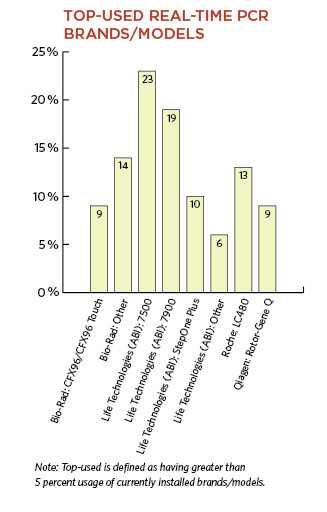In August, the editors of The Scientist, in collaboration with Frost & Sullivan, an international market intelligence and consulting firm, conducted a brief survey of our readers about their use of quantitative real-time PCR (qPCR) and digital PCR (dPCR) technologies. We asked readers about their usage and preferences regarding qPCR and dPCR technologies and what they wished their suppliers would improve. We analyzed data from 363 qualified respondents. The results indicate that although qPCR is considerably more popular as an entrenched laboratory technology, demand for emerging dPCR technology is growing. Explore the factors that researchers think are most important when selecting new qPCR instruments and review the top qPCR product suppliers in the charts below. (Read "Creative Emulsification" in this issue, for a discussion of innovative uses of digital emulsion PCR.)
—Christi Bird, Senior Industry Analyst, Life Sciences, Frost & Sullivan
All figures are rounded

 Nearly all surveyed research laboratories (86 percent) use qPCR, compared to only 9 percent that currently use dPCR. Despite 30 percent of researchers planning to adopt dPCR technology in the next year, qPCR is expected to remain the more commonly used technology.
Nearly all surveyed research laboratories (86 percent) use qPCR, compared to only 9 percent that currently use dPCR. Despite 30 percent of researchers planning to adopt dPCR technology in the next year, qPCR is expected to remain the more commonly used technology.



















